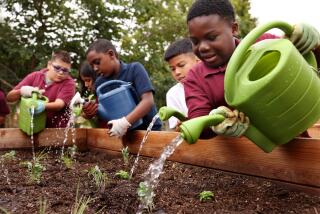Pollution Lesson Was a Day at the Beach
- Share via
THOUSAND OAKS — A class trip to the beach changed the way eighth-grader Kelli Garner will look at the environment forever.
“I knew there would be a lot of trash there,” said Kelli, who cleaned up a stretch of San Buenaventura State Beach with 400 eighth-graders in late March. “But I went back a second time with my friends and I just couldn’t imagine that there was still so much trash after I had cleaned most of it up.”
Disgusted at the amount of garbage people throw into the sea, Kelli said she now is more careful about where her trash goes and has urged her family into a high-gear recycling mode.
“I didn’t really recycle before, but now I do,” she said.
The 13- and 14-year-olds picked up 900 pounds of trash as part of Redwood Intermediate School’s beach cleanup project, spearheaded by science teachers Craig Fox, Steve Nardi and Mark McGhee, who loaded the kids onto a bus and challenged them to tidy the beach, weigh the results and figure out how to protect the planet from future litter.
The heaps of collected junk now rest outside the school’s science labs in neat piles organized by recyclable classification: metals, plastics, wood, fiber.
Energized mostly by the horror of the trash they discovered, the eighth-graders didn’t stop with the one-day field trip.
“What I discovered most on our trek through the beach was the negative effect our sloppy ways have on the beach, the sea, the animals who call it home, and ultimately ourselves,” wrote Matthew Jacobs in a follow-up essay for his science class.
The class is now seeking places to recycle the beverage cans and rusted car parts that washed up on the sand, and the students have been writing industry leaders to scold them for not making more widely recyclable products.
Zach Elsea wrote Quaker Oats to ask the company why Aunt Jemima syrup bottles are made from No. 5 containers, which are not easily recyclable at most places. He is still waiting for an answer.
And Grace Moncrief is hoping to hear from Mott’s why its snack-size applesauce cups also don’t come in an easy-to-recycle containers.
*
Science teacher Fox came up with the “Save the Beaches” project while surfing the Internet, looking for teaching ideas.
He discovered a University of Hartford, Conn., Web site at https://beaches.hartford.edu/#anchor1 where schools from around the world can find out how to clean up beaches and share their results with each other and local and international environmental agencies. In fact, Redwood’s data have been posted on the Internet site and were sent off to the state of California.
What many children say they learned most from the project is how simple it is to correct pollution at the beach.
Ashley Benton said it quite clearly in an essay for her teacher:
“The biggest help would be to stop littering. It
is so easy to find a trash can and throw your garbage away. Only a few short steps, so that our world, our Earth, will be here for generations to come.”
More to Read
Sign up for Essential California
The most important California stories and recommendations in your inbox every morning.
You may occasionally receive promotional content from the Los Angeles Times.













